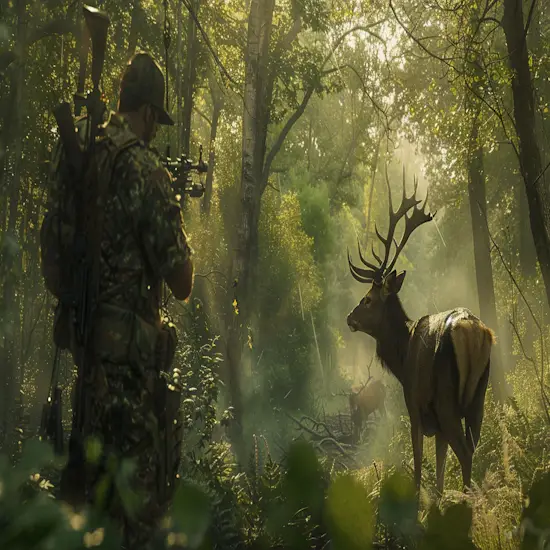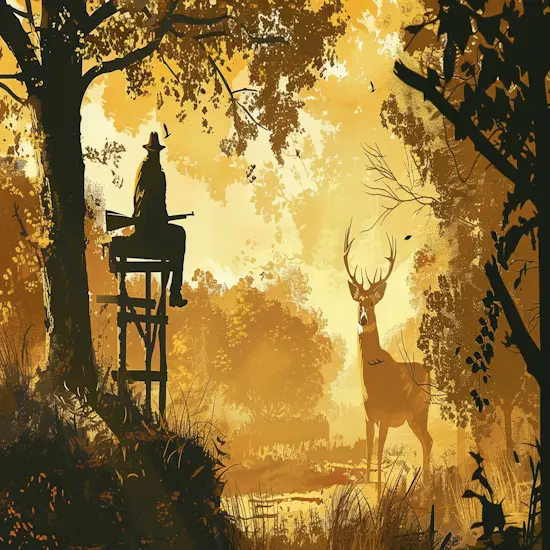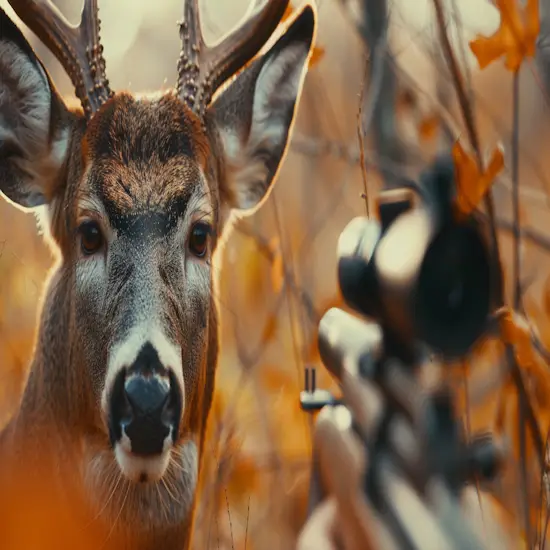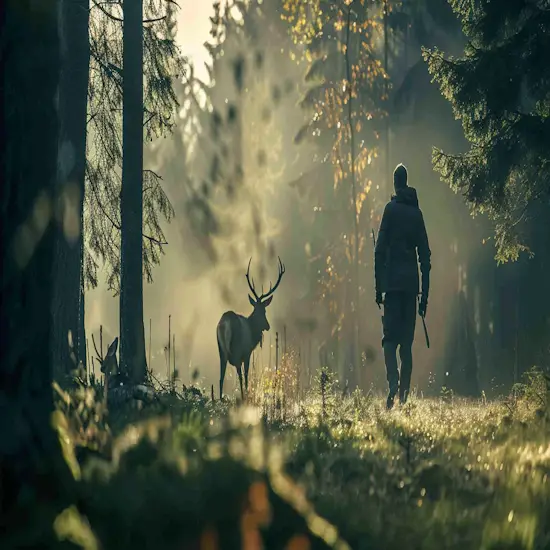Disclosure: We may earn commissions if you purchase products after clicking on a link from our site.
Ethics and etiquette in deer hunting help preserve wildlife populations and hunting traditions. It is important to follow the hunting regulations for safety and conservation.
Hunting seasons, bag limits, fair chase principles, respect for wildlife, and habitats, and ethical values are some of the ethics and etiquette that are required when deer hunting. In this article, we discuss the ethics and etiquette in deer hunting to ensure the right hunting environment.

Table of Contents
Key Takeaways
- Adhere to hunting regulations for safety and sustainability.
- Practice fair chase ethics to respect wildlife.
- Focus on humane shot placement for quick takedowns.
- Respect wildlife and habitats for ecosystem balance.
- Dispose of carcasses lawfully and responsibly.

Understanding Hunting Regulations
Understanding hunting regulations is essential for every ethical hunter. You need to be aware of the rules and guidelines that govern hunting activities in your area. Make sure you comply with all laws and regulations to guarantee responsible and legal hunting practices.
Regulation Importance
Adhering to hunting regulations is essential for ensuring a safe and sustainable hunting environment. Understanding and following these regulations helps protect wildlife populations and maintain a balanced ecosystem.
Regulations set guidelines for hunting seasons, bag limits, and specific rules to prevent overhunting and conserve species. By obeying these rules, you contribute to the long-term health of the environment and the continuation of hunting traditions.
Ignoring regulations can lead to fines, loss of hunting privileges, and harm to wildlife populations. Stay informed about the regulations in your area, keep up to date with any changes, and always hunt ethically and responsibly to preserve the natural world for future generations.
Hunting Law Awareness
Be sure you’re well-informed about hunting regulations to maintain a safe and sustainable hunting environment. Understanding hunting laws is essential to make sure you’re compliant and respectful of wildlife conservation efforts.
Before heading out to hunt, familiarize yourself with local regulations on hunting seasons, bag limits, and specific hunting areas. Make sure to obtain the necessary permits and licenses required for hunting in your region.
It’s vital to follow guidelines on ethical hunting practices and firearm safety to protect both yourself and the environment. By staying informed and adhering to hunting laws, you contribute to the preservation of wildlife populations and the overall health of ecosystems.

Practicing Fair Chase Ethics
When hunting, it’s important to abide by fair chase principles, ensuring a level playing field between you and the deer. Proper shot placement is key for quick, humane kills and responsible wildlife handling. Upholding these values not only shows respect for the animal but also contributes to ethical hunting practices.
Fair Chase Principles
Practicing fair chase ethics in deer hunting involves adhering to principles that prioritize respect for wildlife and uphold the integrity of the hunt. Fair chase principles dictate that hunters should give deer a fair chance to escape, guaranteeing a challenging and ethical pursuit.
This means refraining from using unfair advantages such as baiting or spotlighting, which can compromise the sport’s integrity. It also involves respecting hunting boundaries and regulations, and securing a level playing field for both hunter and prey.
Humane Shot Placement
Guaranteeing compassionate shot placement is crucial in upholding fair chase ethics while deer hunting.
- Target vital body parts to ensure a quick and ethical kill
- Regularly practice shooting skills to enhance accuracy
- Utilize suitable firearms and ammunition for effective kills
- Prioritize clean hits to minimize suffering and ensure a swift dispatch
Responsible Wildlife Handling
To handle wildlife responsibly while practicing fair chase ethics in deer hunting, prioritize swift and humane dispatch through proper shot placement. When aiming for a clean kill, focus on essential organs to guarantee a quick and ethical takedown.
Utilize appropriate firearms and ammunition to minimize suffering and make accurate shots. After a successful shot, promptly approach the downed animal to confirm the dispatch and minimize any potential suffering. Always be prepared to follow up with a secondary shot if necessary.

Focusing on Humane Shot Placement
When hunting deer, it’s vital to focus on humane shot placement for ethical and effective kills. By aiming for precise shots, you guarantee quick and humane takedowns, minimizing suffering for the animal. Precision in your shooting isn’t just about accuracy but also about respect for the wildlife you hunt.
Ethical Shot Placement
For ethical deer hunting practices that prioritize humane shot placement, it’s essential to focus on precision and efficiency when aiming for your target. Here are some key considerations to guarantee humane shot placement:
- Aim for essential organs to guarantee a quick and clean kill.
- Practice shooting from various positions and distances to enhance accuracy.
- Wait for the right moment to take your shot, considering the deer’s position and behavior.
- Use appropriate firearms and ammunition for the size of the game to maximize effectiveness.
Quick, Humane Kills
Focus on important and efficient shot placement for quick, humane kills during deer hunting. The key to guaranteeing a quick and humane kill is hitting essential organs, like the heart or lungs, to bring down the deer swiftly.
Aim for the deer’s crucial, just behind the shoulder, for an ethical and effective shot. This area offers a high chance of hitting essential organs and causing a rapid, humane kill.
Prioritize a clean shot to avoid unnecessary suffering for the animal. Remember, a well-placed shot is important for ethical hunting practices.
Importance of Precision
To secure a swift and compassionate kill during deer hunting, your accuracy in shot placement is crucial.
- Target essential organs such as the heart or lungs
- Practice shooting from different distances and angles
- Take into account shot selection based on deer position and behavior
- Guarantee ethical hunting by making clean and efficient shots

Respecting Wildlife and Habitats
When hunting, it’s essential to respect wildlife and their habitats. Always keep in mind the significance of wildlife conservation, practice responsible hunting behavior, and aim to enhance wildlife habitats.
Wildlife Conservation Importance
Respecting wildlife and habitats is crucial for guaranteeing the preservation of ecosystems and the sustainability of wildlife populations.
- Wildlife conservation guarantees the survival of various species.
- Protecting habitats sustains biodiversity and ecological balance.
- Preserving wildlife populations promotes a healthy environment.
- Respecting wildlife nurtures a harmonious relationship between humans and nature.
Habitat Preservation Practices
Guarantee the preservation of wildlife habitats by implementing responsible hunting practices and advocating environmental conservation efforts.
Respect the natural surroundings by staying on designated paths to avoid damaging sensitive ecosystems.
Refrain from littering, and make sure any waste is properly disposed of.
Be mindful of where you set up camp, keeping a distance from water bodies to prevent contamination.
Avoid cutting trees for firewood; instead, bring your supply.
Leave the environment untouched by cleaning up after yourself and leaving no trace of your presence.
Responsible Hunting Behavior
To show regard for wildlife and their habitats, make sure your hunting practices are responsible and considerate.
- Always follow hunting regulations to protect wildlife populations.
- Respect the environment by avoiding littering and minimizing your impact.
- Be mindful of the habitats you’re in and avoid damaging them.
- Practice humane treatment of animals by ensuring quick and clean kills.
Wildlife Habitat Enhancement
Enhancing wildlife habitats requires important hunting practices to guarantee the well-being of the ecosystem and its inhabitants. By respecting wildlife and habitats, you can contribute to the conservation of diverse species and maintain a balanced environment.
Supporting wildlife habitat enhancement involves actions like planting native vegetation, creating water sources, and minimizing disturbances in hunting areas. Your efforts in enhancing wildlife habitats not only benefit the local ecosystem but also secure sustainable populations for future generations.

Promoting Conservation Efforts
You can play an essential role in promoting conservation efforts by supporting wildlife conservation practices, sustainable habitat management, wildlife population sustainability, and ethical hunting contributions.
Your actions in the field can have a direct impact on the environment and the future of hunting. By incorporating conservation efforts into your hunting practices, you contribute to the long-term health and balance of ecosystems.
Wildlife Conservation Practices
Responsible wildlife conservation practices are essential for preserving natural habitats and sustaining biodiversity.
- Supporting habitat restoration projects
- Participating in wildlife population surveys
- Promoting sustainable hunting practices
- Donating to conservation organizations
Sustainable Habitat Management
Supporting sustainable habitat management practices is important for promoting the long-term conservation efforts of wildlife and their ecosystems. By actively participating in habitat management, you can help create and maintain healthy environments for deer and other wildlife species. This includes activities such as reforestation, wetland restoration, and invasive species control.
Planting native vegetation, maintaining water sources, and preserving natural habitats are key components of sustainable habitat management. By ensuring that deer have access to suitable food sources, shelter, and breeding grounds, you can contribute to the overall health and stability of their populations.
Your efforts in sustainable habitat management play a crucial role in conserving the natural balance of ecosystems and ensuring the future well-being of wildlife.
Wildlife Population Sustainability
Promote the sustainability of wildlife populations through active participation in conservation efforts.
- Support wildlife habitat preservation
- Participate in wildlife population surveys
- Volunteer for wildlife conservation projects
- Advocate for sustainable hunting practices
Ethical Hunting Contributions
When engaging in ethical hunting practices, prioritize the conservation of wildlife habitats and populations. Your contributions play a crucial role in promoting conservation efforts.
By abiding by hunting regulations, practicing fair chase, and utilizing all parts of the animal, you actively support sustainable wildlife populations. Advocating for wildlife conservation and participating in conservation programs further strengthen these efforts.
Remember to dispose of game responsibly, report wildlife violations, and respect private property rights. Your actions not only uphold ethical values but also safeguard ecosystems and support local economies.

Upholding Ethical Principles
When hunting, it’s important to focus on ethical shot placement for quick, humane kills. Advocating for wildlife conservation and responsibly disposing of game are key aspects of upholding ethical principles in deer hunting.
Wildlife Conservation Advocacy
Upholding ethical principles in wildlife conservation advocacy is essential for ensuring the preservation of our natural ecosystems and the protection of diverse species. By advocating for wildlife conservation efforts, you play a vital role in safeguarding ecosystems, promoting ethical values, and supporting sustainable wildlife populations.
Your voice matters in maintaining ecological balance, fostering respect for nature, and strengthening social cohesion. When you advocate for responsible hunting practices and conservation efforts, you contribute to the well-being of not just the animals but also the entire ecosystem.
Responsible Game Disposal
Dispose of harvested game responsibly to uphold ethical hunting principles and maintain environmental integrity.
- Avoid dumping carcasses in waterways
- Bag and dispose of carcasses in landfills
- Transport harvested animals discreetly
- Be a positive representative of the hunting culture
Essential disposal of game isn’t only for ethical reasons but also to prevent environmental contamination. Leaving carcasses in water bodies can harm aquatic ecosystems, so make sure to handle them thoughtfully.
Bagging and disposing of carcasses in designated areas like landfills helps keep the environment clean and safe for other wildlife.
When transporting harvested animals, do so inconspicuously to show respect for both the game and the community.

Ensuring Environmental Conservation
When hunting, it’s crucial to prioritize environmental conservation by preserving wildlife habitats, responsibly disposing of waste, and ensuring sustainable wildlife populations.
By respecting the environment and taking steps to minimize your ecological impact, you contribute to the long-term health of ecosystems and the animals that rely on them.
Wildlife Habitat Preservation
Preserving wildlife habitats is crucial for guaranteeing the conservation of our environment and the well-being of wildlife populations.
- Protecting diverse ecosystems supports wildlife populations.
- Conserving habitats ensures the balance of natural environments.
- Planting native vegetation helps sustain local wildlife.
- Managing invasive species secures the integrity of habitats.
Responsible Waste Disposal
To guarantee the conservation of the environment and wildlife populations, responsible waste disposal practices are paramount in hunting activities. When hunting deer, it’s essential to dispose of carcasses lawfully and responsibly.
Avoid dumping carcasses in waterways, as this can harm the ecosystem. Instead, bag the carcasses and dispose of them in designated landfills. Transport harvested animals discreetly to minimize environmental impact and guarantee a positive image of hunting culture.
Sustainable Wildlife Populations
Ensuring sustainable wildlife populations is essential for the long-term health of ecosystems and the preservation of biodiversity.
- Balancing Harvests: Properly managing hunting quotas to prevent overexploitation.
- Preserving Habitats: Safeguarding and restoring natural habitats to support diverse wildlife populations.
- Monitoring Populations: Regularly evaluating animal numbers and behaviors to inform conservation efforts.
- Promoting Coexistence: Encouraging practices that allow humans and wildlife to thrive together harmoniously.

Practicing Safety Measures
When hunting, always prioritize safety. Make sure to use binoculars to identify your target, maintain a safe distance from other hunters, and be cautious of what lies beyond your target. Safety is key to a successful and responsible hunting experience.
Target Identification Safety
Practicing target identification safety is essential in ensuring a safe hunting experience for both yourself and others around you.
- Always use binoculars to identify targets, not your scope.
- Be fully aware of your target and what lies beyond it.
- Maintain a safe distance from other hunters at all times.
- Respect the first-come, first-served nature of hunting spots to prevent conflicts.
Range Awareness Practices
Maintain a vigilant awareness of your surroundings and fellow hunters while engaging in a range of activities for a safe and secure hunting experience. Always keep track of where other hunters are positioned.
Communication is key; establish clear signals or calls for when it’s safe to shoot. Make sure to identify your target with certainty before taking any action. Utilize binoculars to confirm your target, not your scope. Be mindful of what’s behind your target to prevent any accidents.
Respect the space of other hunters and maintain a safe distance. Prioritize safety by adhering to these range awareness practices for a successful and incident-free hunting trip.
Hunter Distance Etiquette
As you engage in hunting activities, ensure a safe and secure experience by respecting proper hunter-distance etiquette.
- Maintain a safe distance from other hunters at all times.
- Always be aware of your surroundings and what lies beyond your target.
- Use binoculars to identify targets, not your scope, to prevent accidents.
- Respect first-come, first-served hunting spots to avoid conflicts and guarantee safety for everyone involved.
Responsible Carcass Disposal
To responsibly dispose of carcasses, always guarantee lawful and respectful handling practices. When handling deer carcasses, remember to prioritize safety measures. Make sure to avoid dumping carcasses in waterways; instead, bag them properly and dispose of them in designated landfills.
Additionally, when transporting harvested animals, do so discreetly to respect both the environment and the community. Being mindful of how you handle and dispose of carcasses not only guarantees compliance with regulations but also portrays a positive image of ethical hunting practices.

The Bottom Line
Ethics and etiquette in deer hunting is very important for the hunting environment, wildlife conservation, and safety of the hunter and others.
When deer hunting, follow regulations for safety and conservation. Always comply with the hunting seasons, bag limits, and fair chase principles. Aim for humane shot placement to guarantee swift takedowns. Respect wildlife, habitats, and ethical values. Support conservation efforts for sustainable hunting practices.
Moreover, use binoculars, maintain range awareness, and observe hunter-distance etiquette. Dispose of carcasses respectfully and responsibly. Uphold these ethics and etiquette to preserve wildlife populations and hunting traditions. Learn more about responsible hunting practices and environmental conservation for a harmonious human-nature relationship.
By practicing fair chase, respecting wildlife, and promoting conservation efforts, you’re not just hunting, you’re making a positive impact on the environment. Improve your deer hunting skills by understanding deer behavior and habits. Additionally, you can also read about camouflage techniques for deer hunting and the role of scent control in deer hunting.
